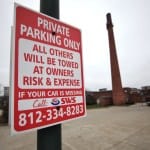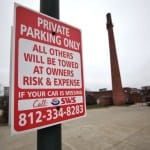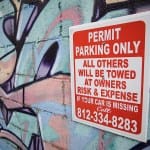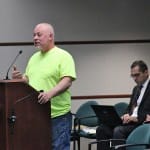Bloomington’s new non-consensual towing ordinance to get more scrutiny, possible revisions before adoption by city council






On Wednesday night, the Bloomington city council’s committee of the whole voted 0–8 on a recommendation to adopt a new non-consensual towing ordinance . That doesn’t kill the legislation.
But the implication of the 0–8 tally is that the council is almost certain to postpone consideration of the new local law, when it appears for a second reading on its Feb. 5 regular meeting agenda.
The general consensus of councilmembers Wednesday night is that they’re still in favor of a regulatory licensing scheme for companies that do non-consensual tows of vehicles that are parked illegally on private property.
But after listening to about 45 minutes of public commentary, local legislators agreed that they need to hear from more than just the owners of towing companies. They want to hear from the owners of properties for whom the towing companies work.
The public included a handful of towing business owners and one lawyer, who addressed the council representing himself.
Attorney Mike Carmin, who told councilmembers that he was speaking for himself, not on behalf of a client, challenged the idea that the business practice of companies who do non-consensual tows is “predatory.” He said their business was no more predatory than than the way parking enforcement officers look for expired parking meters. Private property owners can’t charge a fine, so the only option is towing, he said.
Cars that are parked intentionally on private property, where they are not allowed to park, are trespassing, Carmin said. He defended the ability of private property owners to maintain their private property against that kind of trespass.
Carmin said the proposed ordinance punishes property owners by placing an unreasonable burden on them to manage their private property. He pointed to a feature of the ordinance that requires a written signature from the property owner or their agent—which cannot be a towing company—in order for a non-consensual tow to be done. That’s not a reasonable condition, given that many such tows take place in the middle of the night, Carmin said.
The ordinance would require companies who want to do non-consensual towing to be licensed and pay a $350 annual licensing fee.
Another key feature of the proposed ordinance is a cap on fees. Under the ordinance, fees charged to vehicle owners would be capped at $125 for the towing, $25 for any special equipment needed (like a dolly), and $25 per day for storage, after the day the vehicle arrives at the facility.
The proposed new law would require that a vehicle towed from inside the city limits of Bloomington be stored inside Monroe County. And the vehicle owner would have to be allowed to retrieve their vehicle within 60 minutes of its arrival at the storage facility.
Under the proposed ordinance, a tow company would have to release a vehicle to its owner as soon as proof of ownership is provided and all fees are paid—or 20 percent of fees with a signed payment agreement for the balance.
Under the 20-percent provision, someone who has their car towed and wants to get it back the same day, could pay $25 and sign a payment agreement for the balance of $100.
At a city council Friday work session 10 days ago, the sponsor of the ordinance, councilmember Jim Sims, said the ordinance is meant to prevent people’s cars being towed and made subject to unreasonable fees. Along those same lines, during public commentary on Wednesday, Devin King spoke in support of the proposed ordinance.
What counts as an unreasonable fee, compared to a necessary fee to cover a towing company’s costs, was an issue raised by more than one public commenter. Ken Parrish (Ken’s Westside Service & Towing) told councilmembers he does city-initiated tows, which are not the subject to the new ordinance. (One example of a city-initiated tow is when a drunk driver is pulled over and the police need to get the vehicle out of the public right of way.)
But the two kinds of tows are related, because the cap on allowable fees for non-consensual tows ($125) is intended to match the fee for city-initiated tows.
Under the city’s rules, someone who has their car towed at the city’s direction is able to get their car from storage without paying the towing fee, under certain circumstances, Parrish said. That’s not consistent with the state statute on the subject, he said, but the rate of such “no-pays” is at least 10 percent.
The parallel to the no-pay provision for city-initiated tows is the required payment plan provision for the proposed non-consensual towing ordinance. Parrish said that while it would be possible to take someone to small claims court over a no-pay, even if he won a judgment, he could not get any money out of it. The same principle would apply to administering a payment plan, he said.
Jacob Padawan (Tow Time) said his own experience with payment plans was positive—he had only two outstanding balances out of a total of $108,000 in fees. Still, Padawn thinks offering a payment plan should be up to individual tow companies, not a requirement of the ordinance.
Padawan agreed with a suggestion from Parrish that a website should be established where all towed vehicles could be logged. He said that would reduce the burden on 911 dispatch, the police department, and towing companies who didn’t perform a particular tow, who are all called upon to help people find their cars, after they’ve been towed.
After hearing from tow company owners, councilmember Susan Sandberg said she did not think the legislation could be ready for final consideration by its next regular meeting on Feb. 5. Councilmembers reached a pretty easy consensus on that point.
Councilmember Matt Flaherty mentioned some of the issues he thinks need to be sorted through, based on remarks from towing company operators. Among the issues identified by Flaherty was to make sure that the city’s proposed new ordinance is consistent with state law. Deputy council attorney/administrator Stephen Lucas said he thinks some of the public commentary on the topic was possibly based on a mis-reading of either the state statute or the proposed local ordinance.
Flaherty said he also wanted to understand better the difference between city-initiated tows and non-consensual tows, because the business models for the companies that do those kinds of work seems to be different.
The issue of non-consensual towing is connected to the availability of parking. Both Flaherty and councilmember Steve Volan pointed to that connection in their concluding remarks.
Flaherty pointed out that one of the locations where a lot of consensual tows originate, the downtown Taco Bell location, is across the street from 867 spaces in public parking garages. Yet on a peak day, 278 spaces were still available in the garage. He said the city needs to use better the tool of pricing for parking spaces in garages and on the street.
The fact that a lot of nonconsensual tows happen doesn’t necessarily mean a lack of sufficient parking, Flaherty said, but rather that existing parking resources need to be managed better.
Volan said that nonconsensual towing offered a new angle on “motorist privilege,” the idea some motorists have that they should be able to take their cars anywhere. Volan wrapped up saying, “You can have cheap parking or you can have convenient parking. Pick one.”




Comments ()